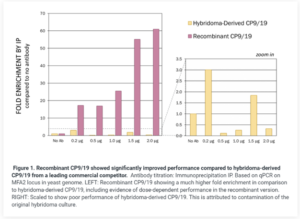At Absolute Antibody, we specialize in the sequencing, engineering, and recombinant expression of antibodies and Fc Fusion proteins. We pride ourselves in going the extra mile to help our clients complete their projects, often taking on difficult challenges and apparent “loss causes.”
This is a story of a project we completed a few years ago using a now outdated PCR-based sequencing approach, and how our novel Next Generation Sequencing (NGS) can provide the same results in less time and with less headache.
The PCR Problem
We were contacted by a client who was concerned about their popular hybridoma-derived anti-cisplatin-modified-DNA antibody CP9/19 and had reason to believe there was historical contamination of the hybridoma. All their attempts to source back to a clonal stock had failed.
The original hybridoma was a rat IgG2a, but we detected only mouse antibody in the culture using a standard isotyping kit. We used a, now outdated, PCR-based sequencing approach and designed a strategy to suppress the mouse sequences and amplify remnants of the rat heavy and light chain sequences. All attempts were unsuccessful and with more than 50 clones sequenced, the path forward looked bleak.
At this point, many organizations would be ready to abandon the project, but the client had detected some limited antibody activity from the hybridoma, meaning the rat cells were in there somewhere. So, we didn’t give up. We began to wonder if we could somehow enrich for the rat hybridoma. As fusions of myeloma and lymphoid cells, hybridomas should express the leukocyte common antigen CD45. Perhaps we could use a mouse-anti-rat CD45 antibody to select for the elusive rat cells expressing the antibody? The thinking paid off, and we obtained a rat sequence for the antibody heavy chain. The light chain, however, still appeared to be from a mouse. This is where our in-house expertise saved the day again. After some scrutiny we identified the “mouse” sequence as an unusual rat allele. Without a high-level of familiarity with antibody sequences and structure, this could easily have gone unnoticed.
With a sequence to work with, we were able to express the antibody using our recombinant platform. The resulting recombinant antibody performed much better compared to a hybridoma-derived version, as shown in the data here, obtained by Simon Reed and his team at Cardiff University.
The NGS Solution
We were very proud to have developed a method to enrich for the rat hybridoma cells from the vast excess of mouse cells. However, this not only took hands-on time to process the cells, but also weeks of culturing to obtain enough of the enriched cells to sequence. Without perseverance and our best guess of the hybridoma-expressed marker, the project would not have been successful.
Absolute Antibody’s innovative Next Generation Sequencing (NGS) prevents the need for such time-consuming processes. Our high-throughput system allows us to deliver all variable heavy (VH) and variable light (VL) domains of the hybridoma cell lines, regardless of species or isotype.
If faced with a similar problem today, we would first sequence all transcripts within the hybridoma using our novel NGS platform. Our team of in-house experts would then review the sequences prior to cloning. Once the sequences are cloned, we would express the transcripts in our animal-free transient system. After expression, the antibodies would undergo purification and quality control testing.
Important to note for this project, NGS can often be used to rescue contaminated or non-viable cells. Once the hybridoma sequence is known, the antibody can be recombinantly expressed indefinitely with high batch-to-batch reproducibility.
Recombinant expression is also the first step towards antibody engineering opportunities, such as species switching, Fc engineering, and bispecifics, just to name a few. The table below shows the anti-cisplatin-modified-DNA formats available off-the-shelf from Absolute Antibody, with other formats possible upon request. The rabbit format is useful for co-labelling studies, while the Fc Silent™ mutation reduces non-specific background in staining methods.
| Antibody Product Code | Species/Format |
|---|---|
| Ab00612-7.1 | Rat IgG2a (orginal format) |
| Ab00612-7.4 | Rat IgG2a (Fc Silent™) |
| Ab00612-23.0 | Rabbit IgG |
No hybridoma? No problem! Absolute Antibody offers antibody protein and polyclonal antibody sequencing. Find out more about our sequencing services here.
To learn more about Absolute Antibody and our custom services, including antibody engineering and expression, visit our website or contact us.
Latest News
Upcoming Events
Please join us at the following conferences and events. Stop by our booth, or get in touch to arrange a meeting.
See All Dates
 United Kingdom (UK)
United Kingdom (UK) 
